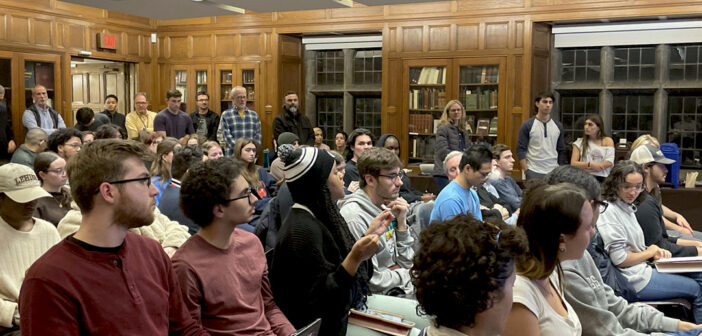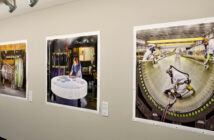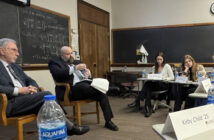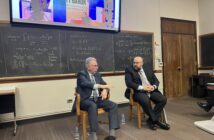Three professors considered academic experts on topics relevant to Israel and Palestine presented and answered student questions at a “teach-in” in Linderman Library on Dec. 5.
The event, which had over 100 people in attendance, was hosted by the Berman Center for Jewish Studies, the Center for Global Islamic Studies, and the College of Arts and Sciences.
The featured speakers included history professor Nitzan Lebovic, who is also the Apter Chair of Holocaust Studies and Ethical Values at Lehigh; anthropology professor Allison Mickel, who is also the director of the global studies program at Lehigh; and anthropology professor Sa’ed Atshan, who is also the chair of the peace and conflict studies department at Swarthmore College — the oldest peace and conflict studies department in the country, with its first course being taught in 1888.
“We’re having this teach-in at the request of students,” Mickel said. “And I think that speaks to Lehigh students’ readiness to engage in a really scholarly and intellectual conversation about this issue.”
In his presentation, Lebovic outlined prior conflicts, the role of other countries and groups in the landscape of today’s conflict to frame the recent attack and response in the longer history of the Israel-Palestine conflict, rather than separate the Gaza problem from the West Bank issue.
“We can debate interpretations, we can debate or argue about whether that is right or not right, but these are the facts,” Lebovic said. “And I think we need to acknowledge the facts.”
But Mickel said it can be difficult to think about the conflict intellectually, and it’s generally more common for people to analyze it emotionally and politically.
Instead, she wanted to use her expertise to explain how literal objects — whether it be rock carvings, water systems or trash pile-ups — build the environment that surrounds people and informs their understanding of history.
She said it’s relevant when asking political questions because they give off some sense of neutrality but show entrenched political ideologies and agendas.
“There’s something really powerful about holding history in your hands,” Mickel said. “It does work on you. It makes it feel real, like more real than a story will on its own, and it makes you feel (a) connection to the past and ownership over it.”
By studying the objects in places of conflict, she said there can be conversations explicitly about accurate historical preservation of a shared environment where all lives and people’s well-being are threatened.
Atshan had 10 areas he wished to cover during his presentation, one of which involved how violence is discussed. He said the United States seems to understand the conflict with biased chronology, giving more weight to some powerful groups and not others.
Examples he used were: “Palestinian violence comes first and then Israeli violence comes next. Palestinian violence is irrational. Israeli violence is rational…The Palestinians just die whereas Israelis are killed. Israelis engage in self-defense and they have the right to security. Palestinians engaged in terrorism.”
But he said we need to question and invert these statements to see the uneven use of language.
Mickel said these unequal comparisons keep people from having forward-moving conversations and actions.
“Everyone loses in an Olympics of suffering,” Mickel said.
Atshan then talked about his experience at a camp in Maine, called Seeds of Peace, that has brought Palestinians and Israelis together every summer since 1993.
“It was a transformative experience for me, because growing up in the West Bank, the only Israelis that I encountered were either soldiers or they were settlers,” Atshan said. “But it was the first time I was able to actually engage with Israelis as equals and as fellow human beings.”
He said forces are pushing for peace every day, but the challenge is amplifying these voices that may be drowned out by extremists.
Atshan also spoke about a personal connection he has to violence amid the Israel-Hamas conflict. A student he academically advised was shot — and is now paralyzed — when he was with fellow students, speaking Arabic and wearing Palestinian scarves in Burlington, Vermont, late last month. Atshan said the shooting is now being investigated as a hate crime.
Atshan asked the audience to raise their hands if they think Palestinian society is being generally associated with Hamas by Americans, and he said this stereotype is becoming more noticeable.
Scot Dressler, ‘25, said he appreciated the array of perspectives the professors provided and found it encouraging that students were part of the “impetus” of the event.
“A lot of the conversations around Israel and Palestine are really online, and there’s a lot of noise that emerges in those kinds of conversations,” Dressler said. “To be able to sit down to hear scholars talk about it, I think, is really helpful.”
Lebovic said he had no problems organizing the event and is grateful Lehigh is open to these discussions, especially when many universities have found problems with similar events.
Philosophy professor Chad Kautzer said he wouldn’t expect Lehigh administrators to attend the event or hold it against them if they didn’t, but he appreciates the support for it.
“I think it’s best when administration encourages these kinds of spaces but doesn’t feel compelled to somehow make some kind of moral statement and represent the community,” Kautzer said. “Because I think the community is too diverse.”
Aisha Toure, ‘24, asked a question during the Q&A portion of the event about potential existential issues with having conversations that focus on “ground one” topics that may have less impact.
Lebovic said something that worries him is how conversations regarding the conflict in Israel and Gaza are partial and polarized. He emphasized the importance of equal, open dialogue regardless of political views.
“I think the only way to understand and create an honest dialogue is when you understand two viewpoints and bring them together,” Lebovic said. “If you separate them…you’re not sensitive to what the other side’s perspective (is).”
Toure said she believed her question was answered “for the utility of the event” but doesn’t believe it was answered directly.
Kautzer said he enjoyed the event because there were so many people, whom he assumed had differing perspectives, but he would have liked to hear more of these voices to create productive “friction and back and forth.”
Xinhan Xie, ‘26, also asked a question during the Q&A regarding the world’s perspective on reaching a peaceful end to the conflict.
“If peace is something we are chasing, what are the common values that people hold and what are the efforts?” Xie said. “What are the directions that people can go in order to achieve peace?”
Lehigh religion professor Jodi Eichler-Levine, who is also the director of the Berman Center for Jewish Studies, said she left Linderman feeling reflective.
“I’m a professor of Jewish Studies, and I’m a Jewish person, and they’re not the same thing,” Eichler-Levine said. “But as a professor of Jewish studies, I walk away feeling really hopeful that even when people disagree…being able to hold multiple truths in our head at the same time is something we can continue to strive for even when it’s very painful.”






Comment policy
Comments posted to The Brown and White website are reviewed by a moderator before being approved. Incendiary speech or harassing language, including comments targeted at individuals, may be deemed unacceptable and not published. Spam and other soliciting will also be declined.
The Brown and White also reserves the right to not publish entirely anonymous comments.